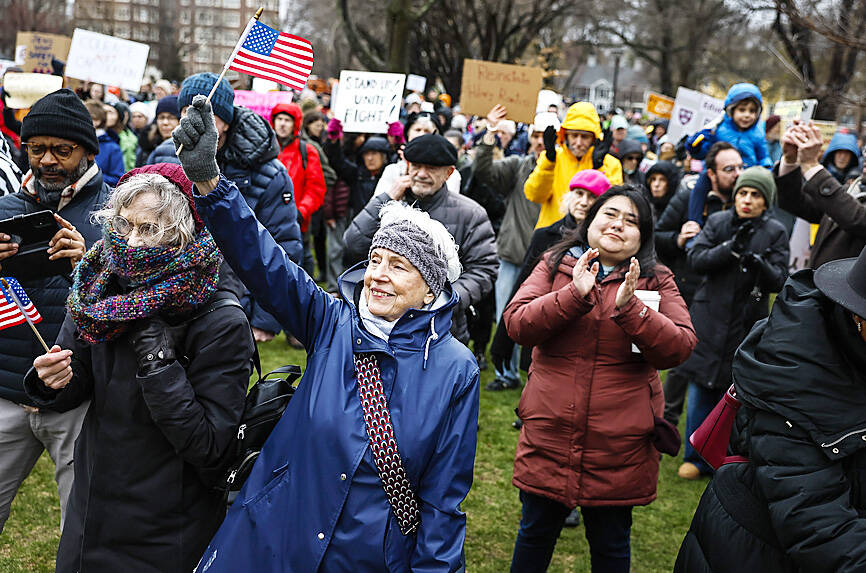Harvard University on Monday was hit with a US$2.2 billion freeze in federal funding after rejecting a list of sweeping demands that the White House said was intended to crack down on campus anti-Semitism.
The call for changes to its governance, hiring practices and admissions procedures expanded on a list Harvard received on April 3, which ordered officials to shut diversity offices and cooperate with immigration authorities for screenings of international students.
Harvard president Alan Garber vowed in a letter to students and faculty to defy the US government, insisting that the school would not “negotiate over its independence or its constitutional rights.”

Photo: Boston Globe via AP
US President Donald Trump’s Joint Task Force to Combat Anti-Semitism responded with a statement announcing the US$2.2 billion hold in grants, plus a freeze on US$60 million of government contracts.
“Harvard’s statement today reinforces the troubling entitlement mindset that is endemic in our nation’s most prestigious universities and colleges — that federal investment does not come with the responsibility to uphold civil rights laws,” it said. “The disruption of learning that has plagued campuses in recent years is unacceptable. The harassment of Jewish students is intolerable. It is time for elite universities to take the problem seriously and commit to meaningful change if they wish to continue receiving taxpayer support.”
Campuses across the US were rocked last year by student protests against Israel’s war in Gaza, with some resulting in violent clashes involving police and pro-Israel counterprotesters.
Trump and other Republicans have accused the activists of supporting Hamas, a US-designated terrorist group whose deadly attack on Oct. 7, 2023, against Israel sparked the conflict.
The US Department of Education last month announced that it had opened an investigation into 60 colleges and universities for alleged “anti-Semitic harassment and discrimination.”
Garber’s letter came after the administration placed US$9 billion of federal funding to Harvard and its affiliates under review.
The US government on Friday last week sent Harvard a much more detailed list demanding an “audit” of the views of students and faculty, which the university made public.
Harvard generated an operating surplus of US$45 million on a revenue base of US$6.5 billion in the last financial year.
Garber said the school was “open to new information and different perspectives,” but would not agree to demands that “go beyond the lawful authority of this or any administration.”
“No government — regardless of which party is in power — should dictate what private universities can teach, whom they can admit and hire, and which areas of study and inquiry they can pursue,” Garber said.
Harvard’s response to the White House’s demands was in sharp contrast to the approach taken by Columbia University, the epicenter of last year’s protests.
The Trump administration cut US$400 million in grants to the private New York school, accusing it of failing to protect Jewish students from harassment as protesters rallied against Israel’s Gaza offensive.
The school responded by agreeing to reform student disciplinary procedures and hiring 36 officers to expand its security team.
As well as the funding cut, immigration officers have targeted two organizers of the protests at Columbia — Mahmoud Khalil, whom the government is seeking to deport, and Mohsen Mahdawi, who was arrested on Monday as he attended an interview to become a US citizen.

The military is to begin conscripting civilians next year, Cambodian Prime Minister Hun Manet said yesterday, citing rising tensions with Thailand as the reason for activating a long-dormant mandatory enlistment law. The Cambodian parliament in 2006 approved a law that would require all Cambodians aged 18 to 30 to serve in the military for 18 months, although it has never been enforced. Relations with Thailand have been tense since May, when a long-standing territorial dispute boiled over into cross-border clashes, killing one Cambodian soldier. “This episode of confrontation is a lesson for us and is an opportunity for us to review, assess and

IDENTITY: A sex extortion scandal involving Thai monks has deeply shaken public trust in the clergy, with 11 monks implicated in financial misconduct Reverence for the saffron-robed Buddhist monkhood is deeply woven into Thai society, but a sex extortion scandal has besmirched the clergy and left the devout questioning their faith. Thai police this week arrested a woman accused of bedding at least 11 monks in breach of their vows of celibacy, before blackmailing them with thousands of secretly taken photos of their trysts. The monks are said to have paid nearly US$12 million, funneled out of their monasteries, funded by donations from laypeople hoping to increase their merit and prospects for reincarnation. The scandal provoked outrage over hypocrisy in the monkhood, concern that their status

The United States Federal Communications Commission said on Wednesday it plans to adopt rules to bar companies from connecting undersea submarine communication cables to the US that include Chinese technology or equipment. “We have seen submarine cable infrastructure threatened in recent years by foreign adversaries, like China,” FCC Chair Brendan Carr said in a statement. “We are therefore taking action here to guard our submarine cables against foreign adversary ownership, and access as well as cyber and physical threats.” The United States has for years expressed concerns about China’s role in handling network traffic and the potential for espionage. The U.S. has

A disillusioned Japanese electorate feeling the economic pinch goes to the polls today, as a right-wing party promoting a “Japanese first” agenda gains popularity, with fears over foreigners becoming a major election issue. Birthed on YouTube during the COVID-19 pandemic, spreading conspiracy theories about vaccinations and a cabal of global elites, the Sanseito Party has widened its appeal ahead of today’s upper house vote — railing against immigration and dragging rhetoric that was once confined to Japan’s political fringes into the mainstream. Polls show the party might only secure 10 to 15 of the 125 seats up for grabs, but it is